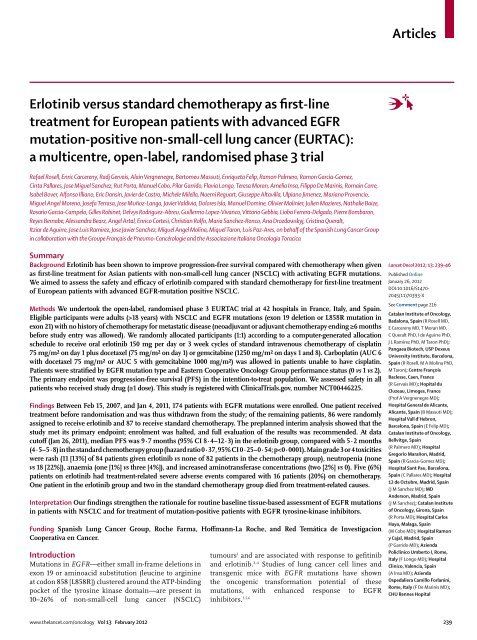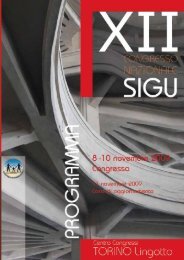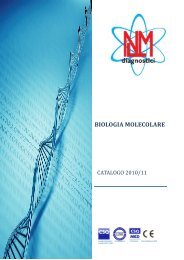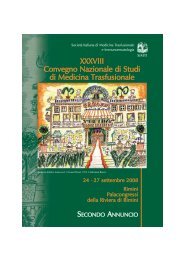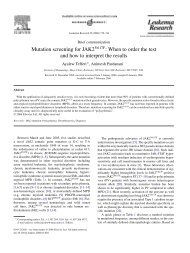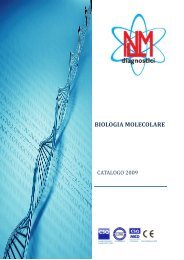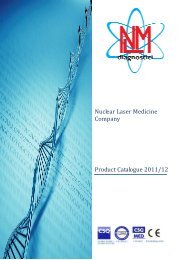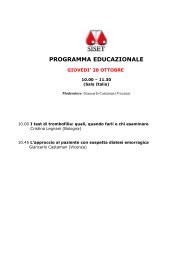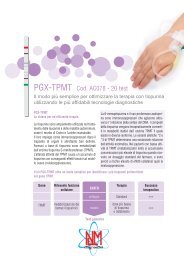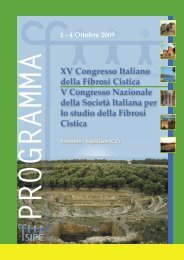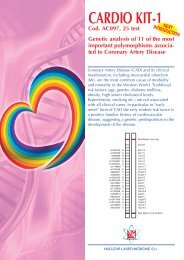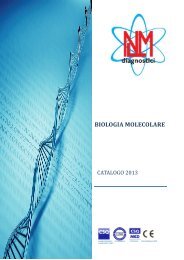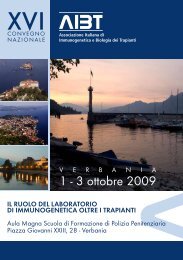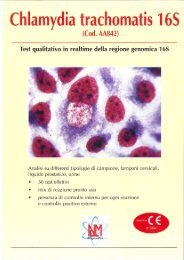You also want an ePaper? Increase the reach of your titles
YUMPU automatically turns print PDFs into web optimized ePapers that Google loves.
<strong>Articles</strong><br />
Erlotinib versus standard chemotherapy as first-line<br />
treatment for European patients with advanced EGFR<br />
mutation-positive non-small-cell lung cancer (EURTAC):<br />
a multicentre, open-label, randomised phase 3 trial<br />
Rafael Rosell, Enric Carcereny, Radj Gervais, Alain Vergnenegre, Bartomeu Massuti, Enriqueta Felip, Ramon Palmero, Ramon Garcia-Gomez,<br />
Cinta Pallares, Jose Miguel Sanchez, Rut Porta, Manuel Cobo, Pilar Garrido, Flavia Longo, Teresa Moran, Amelia Insa, Filippo De Marinis, Romain Corre,<br />
Isabel Bover, Alfonso Illiano, Eric Dansin, Javier de Castro, Michele Milella, Noemi Reguart, Giuseppe Altavilla, Ulpiano Jimenez, Mariano Provencio,<br />
Miguel Angel Moreno, Josefa Terrasa, Jose Muñoz-Langa, Javier Valdivia, Dolores Isla, Manuel Domine, Olivier Molinier, Julien Mazieres, Nathalie Baize,<br />
Rosario Garcia-Campelo, Gilles Robinet, Delvys Rodriguez-Abreu, Guillermo Lopez-Vivanco, Vittorio Gebbia, Lioba Ferrera-Delgado, Pierre Bombaron,<br />
Reyes Bernabe, Alessandra Bearz, Angel Artal, Enrico Cortesi, Christian Rolfo, Maria Sanchez-Ronco, Ana Drozdowskyj, Cristina Queralt,<br />
Itziar de Aguirre, Jose Luis Ramirez, Jose Javier Sanchez, Miguel Angel Molina, Miquel Taron, Luis Paz-Ares, on behalf of the Spanish Lung Cancer Group<br />
in collaboration with the Groupe Français de Pneumo-Cancérologie and the Associazione Italiana Oncologia Toracica<br />
Summary<br />
Background Erlotinib has been shown to improve progression-free survival compared with chemotherapy when given<br />
as first-line treatment for Asian patients with non-small-cell lung cancer (NSCLC) with activating EGFR mutations.<br />
We aimed to assess the safety and efficacy of erlotinib compared with standard chemo therapy for first-line treatment<br />
of European patients with advanced EGFR-mutation positive NSCLC.<br />
Methods We undertook the open-label, randomised phase 3 EURTAC trial at 42 hospitals in France, Italy, and Spain.<br />
Eligible participants were adults (>18 years) with NSCLC and EGFR mutations (exon 19 deletion or L858R mutation in<br />
exon 21) with no history of chemotherapy for metastatic disease (neoadjuvant or adjuvant chemotherapy ending ≥6 months<br />
before study entry was allowed). We randomly allocated participants (1:1) according to a computer-generated allocation<br />
schedule to receive oral erlotinib 150 mg per day or 3 week cycles of standard intravenous chemotherapy of cisplatin<br />
75 mg/m² on day 1 plus docetaxel (75 mg/m² on day 1) or gemcitabine (1250 mg/m² on days 1 and 8). Carboplatin (AUC 6<br />
with docetaxel 75 mg/m² or AUC 5 with gemcitabine 1000 mg/m²) was allowed in patients unable to have cisplatin.<br />
Patients were stratified by EGFR mutation type and Eastern Cooperative Oncology Group performance status (0 vs 1 vs 2).<br />
The primary endpoint was progression-free survival (PFS) in the intention-to-treat population. We assessed safety in all<br />
patients who received study drug (≥1 dose). This study is registered with ClinicalTrials.gov, number NCT00446225.<br />
Findings Between Feb 15, 2007, and Jan 4, 2011, 174 patients with EGFR mutations were enrolled. One patient received<br />
treatment before randomisation and was thus withdrawn from the study; of the remaining patients, 86 were randomly<br />
assigned to receive erlotinib and 87 to receive standard chemotherapy. The preplanned interim analysis showed that the<br />
study met its primary endpoint; enrolment was halted, and full evaluation of the results was recommended. At data<br />
cutoff (Jan 26, 2011), median PFS was 9·7 months (95% CI 8·4−12·3) in the erlotinib group, compared with 5·2 months<br />
(4·5−5·8) in the standard chemotherapy group (hazard ratio 0·37, 95% CI 0·25−0·54; p
<strong>Articles</strong><br />
Ponchaillou, Rennes, France<br />
(R Corre <strong>MD</strong>); Hospital Son<br />
Llatzer, Mallorca, Spain<br />
(I Bover <strong>MD</strong>); Ospedale dei Colli,<br />
Naples, Italy (A Illiano <strong>MD</strong>);<br />
Centre Oscar Lambret, Lille,<br />
France (E Dansin <strong>MD</strong>); Hospital<br />
La Paz, Madrid, Spain<br />
(J de Castro <strong>MD</strong>); Hospital<br />
Regina Elena, Rome, Italy<br />
(M Milella <strong>MD</strong>); Hospital Clinic,<br />
Barcelona, Spain<br />
(N Reguart <strong>MD</strong>); Azienda<br />
Ospedaliera Policlinico G<br />
Martino, Messina, Italy<br />
(G Altavilla <strong>MD</strong>); Hospital de la<br />
Princesa, Madrid, Spain<br />
(U Jimenez <strong>MD</strong>); Hospital<br />
Puerta de Hierro, Madrid, Spain<br />
(M Provencio <strong>MD</strong>); Complejo<br />
Hospitalario de Jaen, Jaen,<br />
Spain (M A Moreno <strong>MD</strong>);<br />
Hospital Son Dureta, Mallorca,<br />
Spain (J Terrasa <strong>MD</strong>); Hospital<br />
Dr Peset, Valencia, Spain<br />
(J Muñoz-Langa <strong>MD</strong>); Hospital<br />
Virgen de las Nieves, Granada,<br />
Spain (J Valdivia <strong>MD</strong>); Hospital<br />
Lozano Blesa, Zaragoza, Spain<br />
(D Isla <strong>MD</strong>); Fundacion<br />
Jimenez-Diaz, Madrid, Spain<br />
(M Domine <strong>MD</strong>); Hospital Le<br />
Mans, Le Mans, France<br />
(O Molinier <strong>MD</strong>); Hospital<br />
Larrey, Toulouse, France<br />
(Prof J Mazieres <strong>MD</strong>); CHU<br />
Angers, Angers, France<br />
(N Baize <strong>MD</strong>); Hospital Teresa<br />
Herrera, La Coruña, Spain<br />
(R Garcia-Campelo <strong>MD</strong>); Centre<br />
Four prospective randomised clinical trials, all of<br />
which were undertaken in Asian patients, showed that<br />
gefiti nib 7–9 and erlotinib 10 as initial treatment for EGFRmutant<br />
NSCLC improved outcomes compared with chemotherapy.<br />
The Iressa Pan-Asia Study (IPASS) 7 enrolled<br />
patients with lung adenocarcinoma who had never smoked<br />
or who were previously light smokers, in dependent from<br />
their EGFR mutation status; patients were randomly<br />
allocated to receive carboplatin plus paclitaxel or gefitinib.<br />
In a subgroup analysis of 261 patients with EGFR mutations,<br />
median progression-free survival (PFS) was 9·5 months<br />
for patients receiving gefitinib compared with 6·3 months<br />
for those receiving chemo therapy (hazard ratio [HR] for<br />
progression 0·48, 95% CI 0·36−0·64; p
<strong>Articles</strong><br />
activating EGFR mutations (exon 19 deletion or L858R<br />
mutation in exon 21), age older than 18 years, and no history<br />
of chemotherapy for metastatic disease (neo adjuvant or<br />
adjuvant chemotherapy was allowed if it ended ≥6 months<br />
before entry to study). Patients with asymptomatic, stable<br />
brain metastases were eligible for inclusion.<br />
The protocol was approved by the institutional review<br />
board of every participating centre, and all patients<br />
provided written informed consent. An independent data<br />
monitoring committee reviewed safety and interim<br />
efficacy data (members listed in the appendix).<br />
Randomisation and masking<br />
A clinical research organisation (PIVOTAL, Madrid, Spain)<br />
did central randomisation with a computer-generated<br />
system. Patients were registered via fax after provision of<br />
informed consent. The system combined stratification<br />
factors and treatments assigned to the previous patients<br />
and then generated the next allocation assignment.<br />
Stratification factors were type of EGFR mutations (exon 19<br />
deletion vs L858R) and Eastern Cooperative Oncology<br />
Group (ECOG) performance status (0 vs 1 vs 2). Participants<br />
were randomly allocated in 1:1 ratio to receive erlotinib or<br />
standard chemotherapy. Throughout the study, doctors<br />
and study participants were not masked to the identity of<br />
the study treatment, because patients were treated with<br />
drugs with different administration routes and schedules.<br />
To avoid bias, centralised randomisation was used, and<br />
PFS and treatment responses were confirmed by an<br />
external review of CT scans by a central review board<br />
(Synarc, San Francisco, CA, USA).<br />
Procedures<br />
Eligible participants received oral erlotinib (150 mg per day)<br />
or 3 week cycles of standard intravenous chemotherapy<br />
(75 mg/m² cisplatin plus 75 mg/m² docetaxel on day 1 or<br />
75 mg/m² cisplatin on day 1 plus 1250 mg/m² gemcitabine<br />
on days 1 and 8). Patients who were ineligible for cisplatin<br />
treatment received intra venous carboplatin chemotherapy<br />
instead (3 week cycles of AUC 6 on day 1 with 75 mg/m²<br />
docetaxel on day 1, or AUC 5 on day 1 with 1000 mg/m²<br />
gemcitabine on days 1 and 8). Pemetrexed had not been<br />
approved for first-line treatment when the study was designed<br />
and was therefore not a treatment option. The choice<br />
of chemotherapy regimen was left to the investigator’s<br />
discretion. Chemotherapy was scheduled for four cycles<br />
unless development of intolerable toxic effects or disease<br />
pro gression occurred. Erlotinib was continued until disease<br />
progression, development of intolerable toxic effects,<br />
or withdrawal of consent. Crossover was part of the study<br />
design and recommended at the time of documented progression<br />
unless contraindicated or refused by the patients.<br />
We obtained all tumour specimens from the original<br />
biopsy sampling before any treatment was given and<br />
before randomisation. We derived genomic DNA from<br />
tumour tissue obtained by laser capture microdissection<br />
(Palm, Oberlensheim, Germany) and isolated DNA from<br />
serum or plasma (or both) with the QIAmp DNA blood<br />
mini kit (Qiagen, Hilden, Germany), starting from 0·4 mL<br />
of material. All tissue samples were analysed with Sanger<br />
sequencing (exons 19 and 21). Additionally, we confirmed<br />
all participants had EGFR mutations with an independent<br />
technique: deletions in exon 19 were established by length<br />
analysis after PCR amplification with a FAM-labelled<br />
primer in an ABI prism 3130 DNA analyser (Applied<br />
Biosystems, Foster City, CA, USA); L858R mutations in<br />
exon 21 were detected with a 5´ nuclease PCR assay<br />
(TaqMan assay, Applied Biosystems) with a FAM MGBlabelled<br />
probe for the wild-type and a VIC MGB-labelled<br />
Erlotinib (n=86)<br />
Standard<br />
chemotherapy<br />
(n=87)<br />
Sex, female 58 (67%) 68 (78%)<br />
Age, years<br />
Mean (SD) 63·44 (10·95) 64·15 (9·23)<br />
Median (range, IQR) 65 (24–82, 56–72) 65 (29–82, 60–71)<br />
Smoking status<br />
Never smoked 57 (66%) 63 (72%)<br />
Previous smoker 22 (26%) 12 (14%)<br />
Current smoker 7 (8%) 12 (14%)<br />
ECOG performance status<br />
0 27 (31%) 30 (34%)<br />
1 47 (55%) 45 (52%)<br />
2 12 (14%) 12 (14%)<br />
Histological diagnosis<br />
Adenocarcinoma 82 (95%) 78 (90%)<br />
Bronchoalveolar<br />
0 2 (2%)<br />
adenocarcinoma<br />
Large-cell carcinoma 3 (3%) 1 (1%)<br />
Squamous-cell carcinoma 1 (1%) 0<br />
Other* 0 6 (7%)<br />
Clinical stage<br />
N3 (not candidate for thoracic 1 (1%) 0<br />
radiotherapy)<br />
IIIA 1 (1%) 0<br />
IIIB (malignant pleural<br />
6 (7%) 5 (6%)<br />
effusion)<br />
IV 78 (91%) 82 (94%)<br />
Bone metastasis<br />
Yes 28 (33%) 29 (33%)<br />
No 58 (67%) 58 (67%)<br />
Brain metastasis<br />
Yes 9 (10%) 11 (13%)<br />
No 77 (90%) 76 (87%)<br />
Type of EGFR mutation<br />
Deletion of exon 19 57 (66%) 58 (67%)<br />
L858R mutation in exon 21 29 (34%) 29 (33%)<br />
Data are n (%) unless otherwise stated. ECOG=Eastern Cooperative Oncology<br />
Group. *Four undifferentiated carcinomas, one pleomorphic carcinoma, and one<br />
adenosquamous carcinoma.<br />
Table 1: Baseline demographic and clinical characteristics of the<br />
intention-to-treat population<br />
Hospitalier Universitaire<br />
Morvan, Brest, France<br />
(G Robinet <strong>MD</strong>); Hospital<br />
Insular de Gran Canaria,<br />
Las Palmas, Spain<br />
(D Rodriguez-Abreu <strong>MD</strong>);<br />
Hospital Cruces, Bilbao, Spain<br />
(G Lopez-Vivanco <strong>MD</strong>); Casa di<br />
Cura La Maddalena, Palermo,<br />
Italy (V Gebbia <strong>MD</strong>); Hospital La<br />
Candelaria, Tenerife, Spain<br />
(L Ferrera-Delgado <strong>MD</strong>); Centre<br />
Hospitalier Emile Muller,<br />
Mulhouse, France<br />
(P Bombaron <strong>MD</strong>); Hospital<br />
Nuestra Señora de Valme,<br />
Sevilla, Spain (R Bernabe <strong>MD</strong>);<br />
Centro di Riferimento<br />
Oncologico, Aviano Pordenone,<br />
Italy (A Bearz <strong>MD</strong>); Hospital<br />
Miguel Servet, Zaragoza, Spain<br />
(A Artal <strong>MD</strong>); La Sapienza<br />
University, Rome, Italy<br />
(E Cortesi <strong>MD</strong>); Clinica Rotger,<br />
Palma de Mallorca, Spain<br />
(C Rolfo <strong>MD</strong>); University of<br />
Alcala de Henares, Madrid,<br />
Spain (M Sanchez-Ronco PhD);<br />
Pivotal, Madrid, Spain<br />
(A Drozdowskyj PhD);<br />
Autonomous University of<br />
Madrid, Madrid, Spain<br />
(Prof J J Sanchez <strong>MD</strong>); and<br />
Hospital Virgen del Rocio,<br />
Sevilla, Spain (L Paz-Ares <strong>MD</strong>)<br />
Correspondence to:<br />
Dr Rafael Rosell, Catalan Institute<br />
of Oncology, Hospital Germans<br />
Trias i Pujol, Medical Oncology<br />
Service, Ctra Canyet,<br />
08916 Badalona, Barcelona, Spain<br />
rrosell@iconcologia.net<br />
For the trial protocol see<br />
http://www.gecp.org/trials/<br />
eurtrac/GECP_06_%2001_<br />
Protocol_Version_f_eng_%2026-<br />
jun-09.pdf<br />
See Online for appendix<br />
www.thelancet.com/oncology Vol 13 February 2012 241
<strong>Articles</strong><br />
A<br />
PFS probability<br />
1·0<br />
0·8<br />
0·6<br />
0·4<br />
0·2<br />
Erlotinib (n=86)<br />
Chemotherapy (n=87)<br />
HR 0·37 (95% CI 0·25–0·54); log-rank p
<strong>Articles</strong><br />
study or the collection of data. Roche Farma and Hoffmann-<br />
La Roche provided input to the analysis and interpretation<br />
of results. The corresponding author had full access to all<br />
the study data and final responsibility for the decision to<br />
submit for publication. All authors attest to the fidelity of<br />
the article, the full protocol, and the statistical analysis.<br />
Results<br />
Between Feb 15, 2007, and Jan 4, 2011, we screened<br />
1227 patients from 42 institutions in Spain, France, and<br />
Italy for EGFR mutations. Results were available in less<br />
than 7 days from receipt of the tumour sample. We<br />
random ly assigned 173 patients with EGFR mutations to<br />
receive erlotinib or standard chemotherapy (figure 1).<br />
33 patients were not candidates for cisplatin treatment and<br />
received carboplatin. Baseline characteristics were well<br />
balanced between the two groups (table 1). All but two<br />
patients were white; 78 (91%) patients in the erlotinib<br />
group and 82 (94%) patients in the standard chemotherapy<br />
group had stage IV disease, and most of the remaining<br />
patients had stage III disease with malignant pleural<br />
effusion (now classified as stage IV disease in the seventh<br />
TNM staging system). One patient in the erlotinib group<br />
had bulky N3 disease that was not suitable for radiotherapy.<br />
The predominant histology was adeno carcinoma in both<br />
groups (table 1).<br />
At final data cutoff (Jan 26, 2011), the median follow-up<br />
was 18·9 months (IQR 10·7–29·0) for the erlotinib group<br />
and 14·4 months (7·1–24·8) for the chemotherapy group.<br />
The median duration of erlotinib treatment was<br />
8·2 months (range 0·3−32·9, IQR 3·1–12·0); the median<br />
duration of chemotherapy treatment was 2·8 months<br />
(0·7−5·1, 1·0–2·6); the median number of chemotherapy<br />
cycles administered was four (one to six, two to four).<br />
Although the planned number of chemotherapy cycles<br />
was four, nine patients continued chemotherapy after the<br />
fourth cycle due to clinical benefit. The appendix shows<br />
reasons for withdrawal from the study in both groups<br />
and information about treatment after discontinuation of<br />
the assigned study drug.<br />
At the preplanned interim analysis (data cutoff<br />
Aug 2, 2010), median PFS was 9·4 months (95% CI<br />
7·9−12·3) in the erlotinib group and 5·2 months (4·4−5·8)<br />
in the standard chemotherapy group (HR 0·42, 95% CI<br />
0·27–0·64; p
<strong>Articles</strong><br />
Figure 2 shows the HRs for the risk of progression by<br />
subgroup. For participants with ECOG performance<br />
status 0, the estimated median PFS was 23·9 months<br />
(95% CI 9·7−not assessable) for patients in the erlotinib<br />
group compared with 6 months (4·3−8·0) for those in<br />
the standard chemotherapy group (p=0·0006;<br />
appendix). For patients with ECOG performance<br />
status 1, estimated median PFS was 8·8 months<br />
(95% CI 7·5−10·8) in the erlotinib group and<br />
5·0 months (4·1−5·5) in the standard chemotherapy<br />
group (p
<strong>Articles</strong><br />
grade 3; table 2). The most common adverse events in the<br />
standard chemotherapy group were anaemia (three [4%]<br />
grade 3) and neutropenia (18 [22%] grade 3–4; table 2). No<br />
increased incidence of pneumonitis was noted in the<br />
erlotinib group (table 2). 11 (13%) patients in the erlotinib<br />
group and 19 (23%) in the standard chemotherapy group<br />
were withdrawn from the trial treatment because of adverse<br />
events. One patient in the erlotinib group and two patients<br />
in the standard chemotherapy group died from treatmentrelated<br />
causes. Table 3 shows a summary of safety data.<br />
Baseline blood samples were available from 109 patients<br />
(57 in the erlotinib group and 52 in the chemotherapy<br />
group). EGFR mutations were detected in the baseline<br />
blood samples of 58 patients (appendix). PFS for patients<br />
with mutations detected in serum was 10·7 months<br />
(95% CI 6·8−15·5) in the erlotinib group compared with<br />
4·2 months (3·2−6·0) in the standard chemotherapy<br />
group (HR 0·25, 95% CI 0·12−0·54; p=0·0002; figure 2,<br />
appendix). PFS for patients in whom mutations were not<br />
detected was 12·6 months (95% CI 8·3−not assessable)<br />
in the erlotinib group compared with 6·0 months<br />
(4·9−9·0) in the standard chemotherapy group (HR 0·29,<br />
95% CI 0·13−0·63; p=0·0010; figure 2, appendix).<br />
Discussion<br />
To our knowledge, EURTAC is the first prospective headto-head<br />
phase 3 study comparing efficacy and safety of<br />
first-line erlotinib with platinum-based chemotherapy in<br />
non-Asian patients with advanced NSCLC and EGFR<br />
mutations (panel). Patients treated with erlotinib had<br />
longer PFS, a higher response rate, and milder side-effects<br />
than did those treated with standard chemotherapy.<br />
The HR for progression in our study was 0·37, which is<br />
akin to the pooled HR for progression of 0·23 (95% CI<br />
0·19–0·27) from the four studies in Asian patients 7–10<br />
(appendix). Together, these findings show benefit for EGFR<br />
tyrosine-kinase inhibitors in Asian and our European<br />
populations. In EURTAC, benefit was seen in most<br />
subgroups of patients included in the analyses, apart from<br />
a notable exception in former smokers. Current smokers<br />
seemed to benefit more from erlotinib than did former<br />
smokers, but the subgroups were too small to draw definite<br />
conclusions. This finding was unexpected and not in line<br />
with previous studies. In the OPTIMAL trial, 10 both present<br />
and former smokers showed a benefit from erlotinib and<br />
former smokers seemed to have a longer PFS compared<br />
with never smokers in our previous study. 13 About 30% of<br />
the patients in the present study were performance status 0,<br />
and the HR for progression in this group of patients was<br />
0·26. The HR for progression for patients with exon 19<br />
deletions was 0·30, compared with 0·55 for those with<br />
L858R mutations. These rates are broadly similar to the<br />
updated analysis of IPASS 19 (HR of 0·38 for exon<br />
19 deletions and 0·55 for L858R). Moreover, in the present<br />
study, the HR for patients with EGFR mutations detected<br />
in serum was 0·25 in favour of erlotinib, which is also in<br />
line with findings from IPASS, 20 in which the HR for<br />
Panel: Research in context<br />
Systematic review<br />
We systematically reviewed PubMed and the Cochrane Library before starting this trial. We<br />
searched for reports published in English before Dec 31, 2006, with the search terms “lung<br />
neoplasm”, “TKI”, “EGFR mutation”, and “first-line therapy”, before assessing the quality of<br />
the evidence according to evidence-based medicine and giving greatest weight to data from<br />
prospective multicentre phase 2 or 3 clinical trials. At the time the EURTAC started, IPASS, 7<br />
the WJTOG3405 study, 8 and the NEJ002 study 9 were in progress. These three studies showed<br />
that gefitinib was better than standard chemotherapy as first-line therapy in Asian patients<br />
with non-small-cell lung cancer (NSCLC) who had EGFR mutations. Results from the<br />
OPTIMAL trial, 10 reported in 2011, noted equivalent effects for erlotinib in Asian patients.<br />
Interpretation<br />
To our knowledge, the EURTAC is the first phase 3 study to show that erlotinib can improve<br />
median progression-free survival in European patients (who were predominantly white)<br />
with EGFR mutation-positive NSCLC compared with standard chemotherapy. Our results are<br />
consistent with previous studies in Asian patients and our own experience in European<br />
patients and suggest that EGFR tyrosine-kinase inhibitors have greater first-line efficacy than<br />
does standard chemotherapy in this group of patients in this setting. Our results also clearly<br />
show the clinical usefulness of testing for EGFR mutations at baseline in patients with NSCLC<br />
to guide treatment and improve outcomes. Despite progress in recent years, lung cancer<br />
remains the leading cause of cancer death, and increased understanding of the potential of<br />
biomarkers will hopefully lead to improved outcomes. We recommend that tissue-based<br />
screening for EGFR mutations be part of routine clinical practice and that EGFR<br />
tyrosine-kinase inhibitors be the standard first-line treatment for patients with NSCLC<br />
and EGFR mutations. Clinicians now know that they need to screen their patients for EGFR<br />
mutations, and if mutations are detected, patients should be started with a tyrosine-kinase<br />
inhibitor—either erlotinib or gefitinib, dependent on the standard of care at each institution.<br />
patients with EGFR mutations in serum was 0·29 in favour<br />
of gefitinib. However, the subgroup analyses must be<br />
interpreted with caution because of the small number of<br />
patients in each group; nonetheless these findings might<br />
be useful for future studies.<br />
In our previous study in patients with NSCLC with EGFR<br />
mutations, the response rate to erlotinib was 71% (139 of<br />
197 assessable patients). 21 In the present study, 49 (64%) of<br />
77 assessable patients treated with erlotinib met the cri teria<br />
for a confirmed response. The confirmed response rate in<br />
the standard chemotherapy group in this study was 18%<br />
(13 of 73 patients), which is lower than was that reported in<br />
the phase 3 trials in Asian patients (31−47%). 7–10 However,<br />
in several phase 3 trials in non-Asian patients comparing<br />
different platinum-based regi mens in advanced NSCLC,<br />
response rates ranged from 15% to 30·6%. 22<br />
In EURTAC, we noted no major differences in overall<br />
survival between the two groups. Recent reports 23,24 suggest<br />
that patients with EGFR mutations who are treated with<br />
erlotinib could respond to chemotherapy at the time of<br />
clinical progression. Furthermore, at the time of clinical<br />
progression, most patients in the standard chemotherapy<br />
group crossed over to receive erlotinib as second-line<br />
treatment, producing a potential carryover effect in these<br />
patients.<br />
Although the protocol called for completion of the lung<br />
cancer symptom scale by all patients to measure quality<br />
www.thelancet.com/oncology Vol 13 February 2012 245
<strong>Articles</strong><br />
of life, the compliance rate was very low. At baseline, 63%<br />
of questionnaires in the standard chemotherapy group<br />
and 70% in the erlotinib group were recorded, but at the<br />
first visit, this rate dropped to 21% in the standard<br />
chemotherapy group and 27% in the erlotinib group. Few<br />
patients com pleted the questionnaire after the four cycles<br />
of chemo therapy, leading to an imbalance in the<br />
completion rate between the two groups. Because of the<br />
low compliance rate and the imbalance between the<br />
groups, the analysis of time to symptomatic progression<br />
was regarded as inconclusive.<br />
The EURTAC results reinforce the feasibility of upfront<br />
geno typing of patients and the improved outcomes attained<br />
with therapy directed against a known target. Taken together<br />
with the findings of the OPTIMAL study, 10 our results<br />
suggest a benefit in PFS with first-line erlotinib in a European<br />
population and confirm those improvements attained<br />
with EGFR targeted agents in Asian patients, thus strengthening<br />
the rationale for routine baseline tissue-based<br />
assessment of EGFR mutations in patients with NSCLC.<br />
Contributors<br />
RR and LP-A were the principal investigators. RR, BM, TM, MS-R, JJS,<br />
and LP-A contributed to protocol design, recruitment of patients, and data<br />
interpretation. AD and JJS did the statistical analyses. CQ, IdA, JLR, and<br />
MAM did the molecular analyses. MT supervised the molecular analyses.<br />
RR wrote the manuscript. All other authors helped recruit patients.<br />
All authors reviewed and approved the final version of the manuscript.<br />
Conflicts of interest<br />
LP-A has given scientific advice and lectures with compensation from<br />
Hoffmann-La Roche. RC has received travel grants and consulted for<br />
Hoffmann-La Roche at an advisory board meeting for bevacizumab.<br />
All other authors declared no conflicts of interest.<br />
Acknowledgments<br />
Hoffmann-La Roche provided erlotinib to eligible patients for free. The<br />
study was partially funded by Roche Farma, Hoffmann-La Roche, and<br />
Red Temática de Investigacion Cooperativa en Cancer (grant<br />
RD06/0020/0056). We thank the medical oncologists, biologists, nurses,<br />
data managers, and administrative staff who helped make this study<br />
possible (especially Margarita Majem, Joaquim Bosch-Barrera,<br />
Mariacarmela Santarpia, Dinesh Lalchandani, Cristina Buges,<br />
Erika Mijangos, and Jose Antonio Lopez-Vilariño); Daniel Costa,<br />
Caicun Zhou, and Ilze Bara for helpful comments on early versions of<br />
the manuscript; Alain Vergnenegre, Filippo De Marinis, and<br />
Bartomeu Massuti for their key role as coordinators of their respective<br />
national lung cancer groups; and representatives of Roche Farma and<br />
Hoffmann-La Roche who contributed time and effort to this study<br />
(especially Nils Eckardt, Mariette Schlegel, Alberto Fittipaldo, Ilze Bara,<br />
Maximo Carreras, Ali Zeaiter, and Gaelle Klingelschmitt).<br />
References<br />
1 Pao W, Chmielecki J. Rational, biologically based treatment of<br />
EGFR-mutant non-small-cell lung cancer. Nat Rev Cancer 2010;<br />
10: 760–74.<br />
2 Lynch TJ, Bell DW, Sordella R, et al. Activating mutations in the<br />
epidermal growth factor receptor underlying responsiveness of<br />
non-small-cell lung cancer to gefitinib. N Engl J Med 2004;<br />
350: 2129–39.<br />
3 Paez JG, Janne PA, Lee JC, et al. EGFR mutations in lung cancer:<br />
correlation with clinical response to gefitinib therapy. Science 2004;<br />
304: 1497–500.<br />
4 Pao W, Miller V, Zakowski M, et al. EGF receptor gene mutations<br />
are common in lung cancers from “never smokers” and are<br />
associated with sensitivity of tumors to gefitinib and erlotinib.<br />
Proc Natl Acad Sci USA 2004; 101: 13306–11.<br />
5 Ji H, Li D, Chen L, et al. The impact of human EGFR kinase<br />
domain mutations on lung tumorigenesis and in vivo sensitivity to<br />
EGFR-targeted therapies. Cancer Cell 2006; 9: 485–95.<br />
6 Politi K, Zakowski MF, Fan PD, Schonfeld EA, Pao W, Varmus HE.<br />
Lung adenocarcinomas induced in mice by mutant EGF receptors<br />
found in human lung cancers respond to a tyrosine kinase inhibitor<br />
or to down-regulation of the receptors. Genes Dev 2006; 20: 1496–510.<br />
7 Mok TS, Wu YL, Thongprasert S, et al. Gefitinib or carboplatinpaclitaxel<br />
in pulmonary adenocarcinoma. N Engl J Med 2009;<br />
361: 947–57.<br />
8 Mitsudomi T, Morita S, Yatabe Y, et al. Gefitinib versus cisplatin plus<br />
docetaxel in patients with non-small-cell lung cancer harbouring<br />
mutations of the epidermal growth factor receptor (WJTOG3405): an<br />
open label, randomised phase 3 trial. Lancet Oncol 2010; 11: 121–28.<br />
9 Maemondo M, Inoue A, Kobayashi K, et al. Gefitinib or<br />
chemotherapy for non-small-cell lung cancer with mutated EGFR.<br />
N Engl J Med 2010; 362: 2380–88.<br />
10 Zhou C, Wu Y-L, Chen G, et al. Erlotinib versus chemotherapy as<br />
first-line treatment for patients with advanced EGFR mutation-positive<br />
non-small-cell lung cancer (OPTIMAL, CTONG-0802): a multicentre,<br />
open-label, randomised, phase 3 study. Lancet Oncol 2011; 12: 735–42.<br />
11 Hirsch FR, Kabbinavar F, Eisen T, et al. A randomized, phase II,<br />
biomarker-selected study comparing erlotinib to erlotinib<br />
intercalated with chemotherapy in first-line therapy for advanced<br />
non-small-cell lung cancer. J Clin Oncol 2011; 29: 3567–73.<br />
12 Sequist LV, Martins RG, Spigel D, et al. First-line gefitinib in<br />
patients with advanced non-small-cell lung cancer harboring<br />
somatic EGFR mutations. J Clin Oncol 2008; 26: 2442–49.<br />
13 Rosell R, Moran T, Queralt C, et al. Screening for epidermal growth<br />
factor receptor mutations in lung cancer. N Engl J Med 2009;<br />
361: 958–67.<br />
14 Therasse P, Arbuck SG, Eisenhauer EA, et al. New guidelines to<br />
evaluate the response to treatment in solid tumors. European<br />
Organization for Research and Treatment of Cancer, National<br />
Cancer Institute of the United States, National Cancer Institute of<br />
Canada. J Natl Cancer Inst 2000; 92: 205–16.<br />
15 Cancer Therapy Evaluation Program, Common Terminology<br />
Criteria for Adverse Events, Version 3.0. http://ctep.cancer.gov/<br />
protocolDevelopment/electronic_applications/docs/ctcaev3.pdf<br />
(accessed Jan 11, 2011).<br />
16 Costa DB, Kobayashi S, Tenen DG, Huberman MS. Pooled analysis<br />
of the prospective trials of gefitinib monotherapy for EGFR-mutant<br />
non-small cell lung cancers. Lung Cancer 2007; 58: 95–103<br />
17 Lan KK, Lachin JM. Implementation of group sequential logrank<br />
tests in a maximum duration trial. Biometrics 1990; 46: 759–70.<br />
18 International Conference on Harmonization of Technical<br />
Requirements for Registration of Pharmaceuticals for Human Use<br />
(ICH). Medical Dictionary for Regulatory Activities (MedDRA)<br />
version 13.0 (accessed Aug 2, 2010).<br />
19 Fukuoka M, Wu YL, Thongprasert S, et al. Biomarker analyses and<br />
final overall survival results from a phase III, randomized,<br />
open-label, first-line study of gefitinib versus carboplatin/paclitaxel<br />
in clinically selected patients with advanced non-small-cell lung<br />
cancer in Asia (IPASS). J Clin Oncol 2011; 29: 2866–74.<br />
20 Goto K, Ichinose Y, Ohe Y, et al. Epidermal growth factor receptor<br />
mutation status in circulating free DNA in serum: from IPASS,<br />
a phase III study of gefitinib or carboplatin/paclitaxel in NSCLC.<br />
J Thorac Oncol 2012; 7: 115–21.<br />
21 Rosell R, Molina MA, Costa C, et al. Pretreatment EGFR T790M<br />
mutation and BRCA1 mRNA expression in erlotinib-treated<br />
advanced non-small-cell lung cancer patients with EGFR mutations.<br />
Clin Cancer Res 2011; 17: 1160–68.<br />
22 Goldstraw P, Ball D, Jett JR, et al. Non-small-cell lung cancer. Lancet<br />
2011; 378: 1727–40.<br />
23 Chmielecki J, Foo J, Oxnard GR, et al. Optimization of dosing for<br />
EGFR-mutant non-small cell lung cancer with evolutionary cancer<br />
modeling. Sci Transl Med 2011; 3: 90ra59.<br />
24 Sequist LV, Waltman BA, Dias-Santagata D, et al. Genotypic and<br />
histological evolution of lung cancers acquiring resistance to EGFR<br />
inhibitors. Sci Transl Med 2011; 3: 75ra26.<br />
246 www.thelancet.com/oncology Vol 13 February 2012


